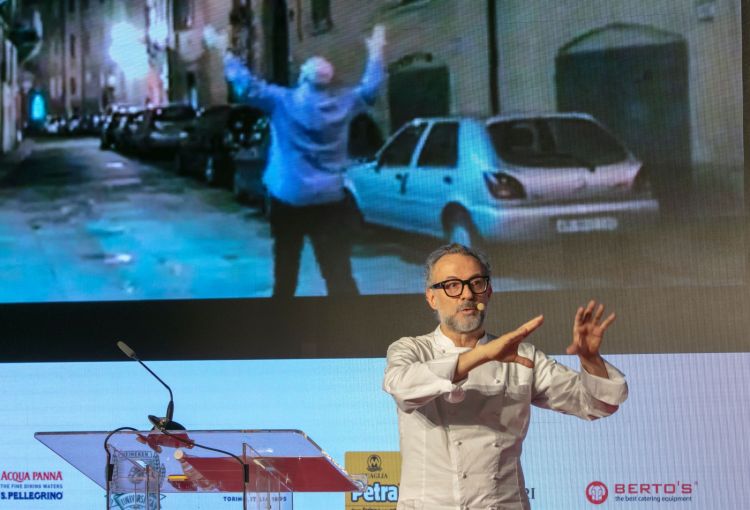For the 14th year in a row Massimo Bottura speaks in front of a full Auditorium. And he’s likely to do the same in 2020 if it is to follow his latest speech at Identità Golose, an address as passionate as ever, so much so that a couple of times he has to retrace his steps, so emotional he lost the thread: «Speaking from this stage is always incredible», he starts, supported by a thundering welcome.
Culture, knowledge, awareness, sense of responsibility. This chain of urgent matters once again defines the outline of his speech, a poker that we at Identità know well, but which is worth repeating infinite times because only this way, it will stick in people’s minds. After all, after all this repeating, «We’ve initiated a humanistic revolution: in 2003 when we looked at the rubbish bins in our restaurants they were full of left overs. This is no longer the case».
Culture, the first of the 4 pillars, supported the entire speech, «I come from a province where knowledge comes first: my father’s greatest wish was a degree from university, not 3 Michelin stars. This is the highest social acknowledgement. But it’s also the impulse that pushed me when, after the internships with Georges Cogny, Alain Ducasse, after New York and Ferran Adrià, I returned to my hometown, Modena, because I wanted to do something different. Who would have thought I would have to face all these challenges». Or that he would receive 3 honorary degrees a few years later.
«In almost 25 years of
Osteria Francescana many things have changed but some things have remained the same: the approach through which we seep through the past, always with criticism, never with nostalgia. We do so to guide the best from the past into the future. We have fun like children, transforming ideas into edible content. Which generates awareness, vision, intuition, faith. They are all crossings that channel the rational and the emotional». The medium, the toolbox that will guide the journey to responsibility.
«Food is a demonstration of culture» is one of the possible titles to his speech, «Restaurants are becoming a Renaissance workshop, a workshop of ideas in which you produce culture. Like our artworks in Via Stella, windows overlooking landscapes made of ideas. Overlooking the craft of cheese producers, farmers, wine and vinegar producers. Culture generates tourism: it’s the first time that we see tourists in Modena, in San Cassiano, in Licata». These are implicit references to the example set by two other stars like Norbert Niederkofler or Pino Cuttaia.
Restaurants, however, are made of people, not things: «It’s these young guys who keep Francescana alive. Dishwasher Jahid is as important as Davide [Di Fabio] and Taka (Kondo), the sous chefs. A perfect service gives joys that are meaningless unless you share them with others. These emotions can last a lifetime».
TORTELLANTE. In Bottura’s structure, the roof is represented by the sense of responsibility: «With the Refettorios and with Food for Soul we have found new ways of expressing a social gesture. We’ve moved the everyday focus to suburban communities, to isolated families, to disadvantaged individuals». This didn’t happen just with the Refettorios (By the way, «We’re about to open also in Merida, in the United States, in Florence, Montreal, Sydney and in Ecuador») but also with Tortellante, the real news of this speech.

LA PATATA. Alle spalle del cuoco, Bob Noto (1956-2017)
«In Modena tortellini are an institution; in fact, a religion. Two years ago
Silvia, a childhood friend, gave me the inspiration: how about if we taught disadvantaged kids how to make tortellini, she said to me. The
rezdore, the grandmothers, mothers of these disadvantaged kids could do it.
Rezdore have kept families together for a lifetime. My son
Charlie could make tortellini, he’s also a special kid. We immediately understood the value of this project. We got working, raised funds. At first, we had 7-8 kids. But good news move fast. They are now 35. We realised that
Tortellante could be extended beyond after-school activities, it could become a bridge between school and life, create jobs. We now receive so many requests, we cannot satisfy everyone:
Chicco Cerea,
Tetrapak have ordered hundreds of kilos. So much so that
Charlie protested: ‘You’re making me work like a slave’». A touching moment.
Time for the dish, Guinea Fowl, a masterful execution in three acts which we presented in detail a few weeks ago. «It’s a work that hints at the great finale of an opera, after the adagio, minuetto and allegro. And we used every part of the animal, this is what sense of responsibility is about». He returns to the concept of journey, following his iconic irony, which turns a framework upside down, back to the beginning, to culture. The screen shows images of a candid Mirella Cantarelli from Samboseto, when Luigi Veronelli interviewed her on the legendary Guinea Fowl with clay. Then it’s time for famous Potato that wanted to become a truffle. A fun image from Bob Noto is an ode to the tuber, «I miss Bob so much; without him and Giorgio Grigliatti Italian cuisine would not stand where it stands now». Three minutes of applauses.
Translated into English by Slawka G. Scarso